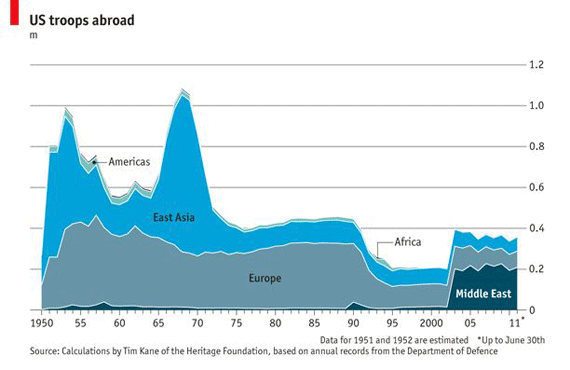Friday File: Does the United States Matter Less?

Above the Fold. I had the good fortune to spend the last two days at a conference with leading foreign policy thinkers from across South America discussing opportunities and obstacles in the hemisphere. We covered the range of topics you would expect at such a confab: trade, economic growth, regional integration, energy, drug trafficking, inequality, and climate change. The most animated discussions, however, were about American politics. Simply put, the diplomats and scholars at the conference were puzzled at how dysfunctional American politics have become and bewildered that so much of the political discussion in the United States seems oblivious of the broader trends in the world, most notably the dispersion of economic and political power around the globe. The concerns I heard seemed more motivated by the sadness you might feel for a friend who has gone astray than a sense of fear that America’s problems would derail progress elsewhere in the hemisphere. As one seasoned diplomat put it to me, "Americans have yet to grasp that unlike in the past, much of what happens in the United States doesn’t matter to people outside of it." The accuracy of that sentiment may be debatable. But it does suggest, that contrary to all the talk in the Republican presidential debates about restoring American global leadership, many of the countries we think of as our friends aren’t sitting around waiting for direction from Washington. They are off pursuing their own visions and interests, and they may not be terribly accommodating when Washington finally does come calling.
Read of the Week. If you are feeling whip-lashed by the gyration of the financial markets over the eurozone crisis, you probably aren’t alone. Last week things looked gloomy. This week things look sunny. So are happy days here again? Or are we witnessing a false dawn? I haven’t a clue. But I do know that if you want a better understanding of the eurozone crisis you should check out the effort by the New York Times Sunday Magazine to explain the financial crisis in plain English.
Blog Post of the Week. My colleague Ed Husain is in Egypt this week where the early returns suggest that Islamist parties have done very well, potentially picking up two-thirds to three-quarters of the seats in parliament. The fact that Islamist parties did well is not in and of itself surprising. What is surprising is how well Salafist groups did. Salafis offer the most fundamentalist version of Islam, and as Ed writes, their success offers reasons to worry about Egypt’s future direction.
Poll Question of the Week. Ask Americans what they think of Iran’s leaders, and the answer is "not much." So what do Iranians think about U.S. leaders? Gallup asked Iranians just this question earlier this year. It turns out that they return Americans’ lack of affection--only 9 percent of Iranians approve of U.S. leadership. Iranians are equally unenthusiastic about Britain’s leaders and only slightly more enthusiastic (12 percent) about the EU’s leaders. The silver lining in this bad news is that better educated Iranians are more likely to approve of western leaders than less educated Iranians are. But overall the thrust of the Gallup numbers is that Americans and Iranians see the world very differently, and that suggests that U.S.-Iranian relations will be troubled for years to come.
Chart of the Week. President Obama’s headline message during his recent trip to Asia was that the United States is committed to the security of its friends and allies in the region. Obama backed up his words by signing a bilateral defense treaty with Australia that, among other things, provides for stationing 2,500 Marines in northern Australia. As this week’s chart shows, the U.S. military presence in East Asia has declined markedly since the 1960s. Today the American presence in East Asia is equivalent to the American presence in Europe. Given the fiscal constraints the United States faces as well as the concerns that many countries in the region have about antagonizing China, it is debatable how much larger the U.S. military presence in Asia will get even as U.S. troop deployments in the Middle East decline.
Source: The Economist.
Too Good Not to Note. Josh Kurlantzick offers some ideas on what the Obama administration should do to take advantage of the recent political opening in Myanmar. Robert Danin asks whether Saudi Arabia is the next Arab government to confront growing internal unrest. Jim Tankersley writes that Europe is closer than we think to bringing down the American--and global--economy. Gregory McNeal reviews the rules and procedures that the U.S. military uses to make targeting decisions. Scott Firsing hands out the 2011 award for the most corrupt BRICS country. David Frum asks, when did the GOP lose touch with reality? Ken Rogoff asks if modern capitalism is sustainable.
Perils of Prediction. "To throw bombs from an airplane will do as much damage as throwing bags of flour. It will be my pleasure to stand on the bridge of any ship while it is attacked by airplanes." Newton Baker, U.S. Secretary of War, 1921. Secretary Baker wisely never carried out his rather rash pledge.
Quote to Ponder. "Failure is the condiment that gives success its flavor." Truman Capote, "Self-Portrait," Portraits and Observations: The Essays of Truman Capote
A Reason to Smile. "40 to 34"
 Online Store
Online Store

